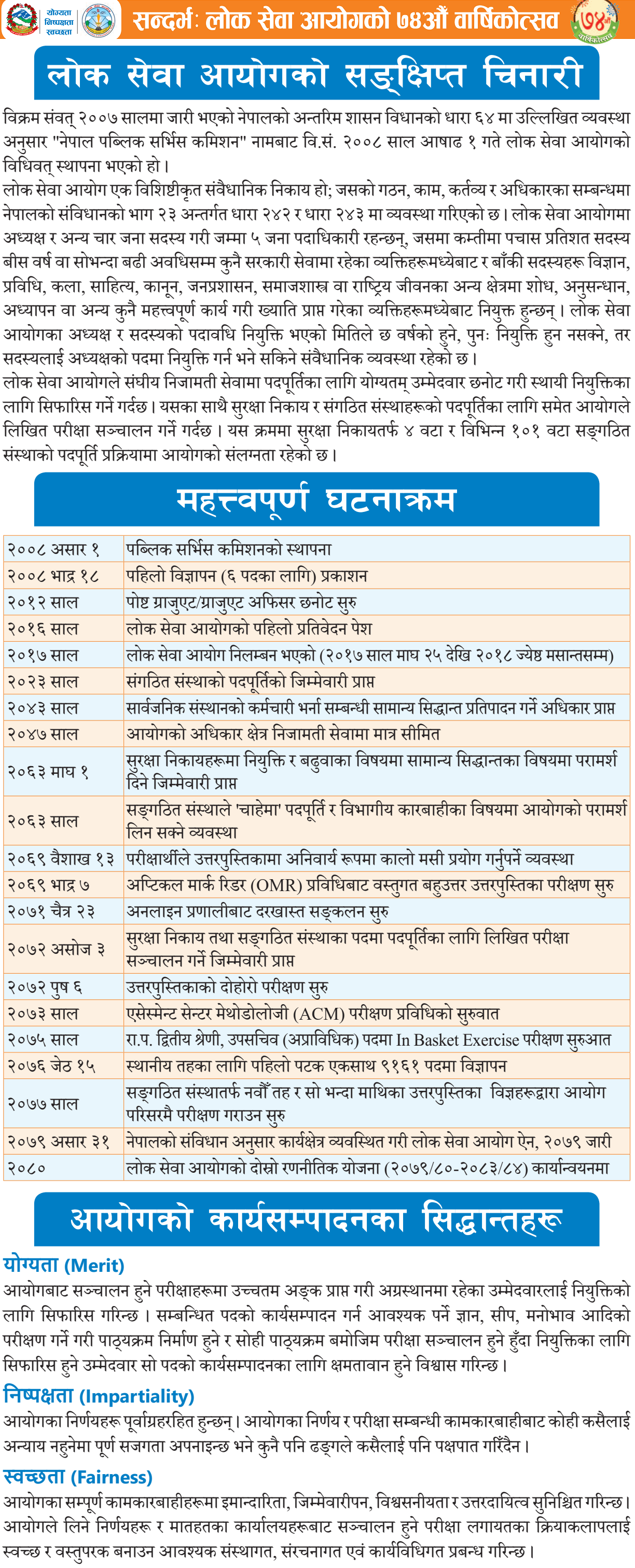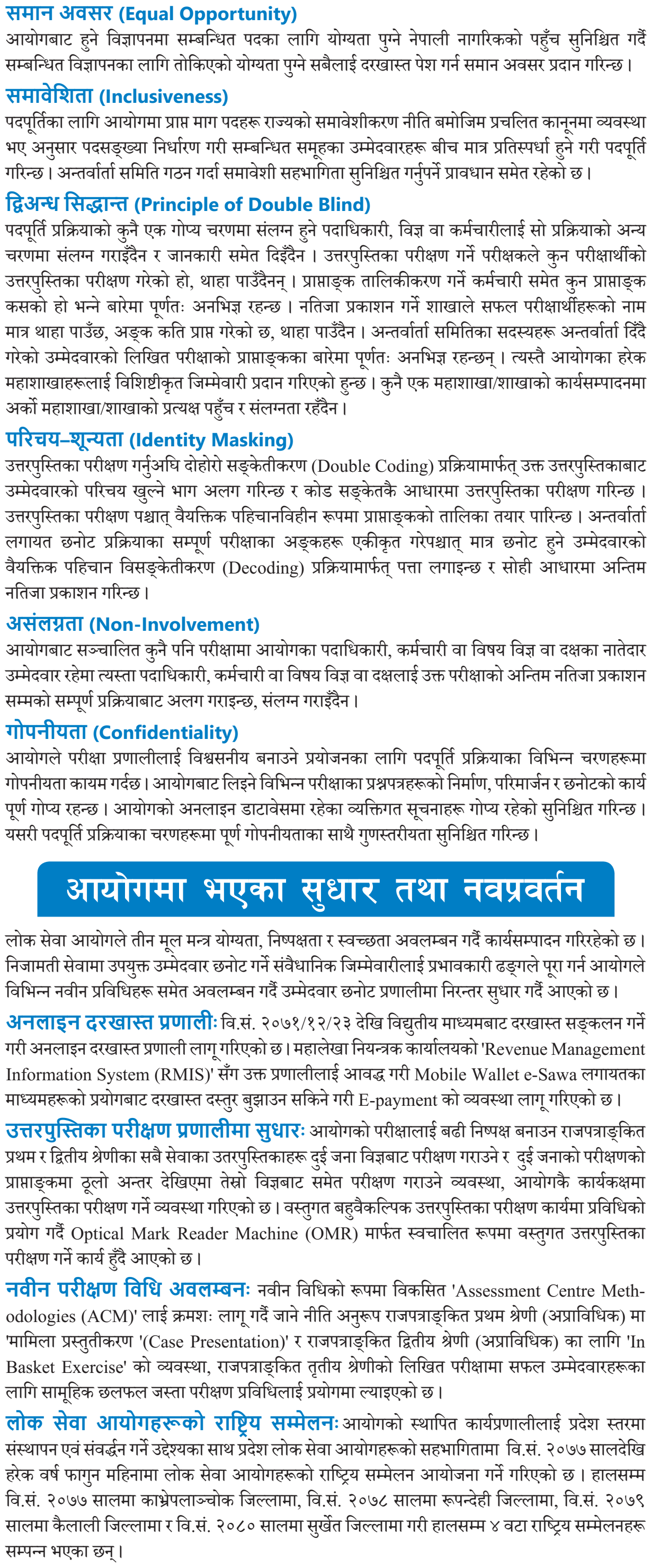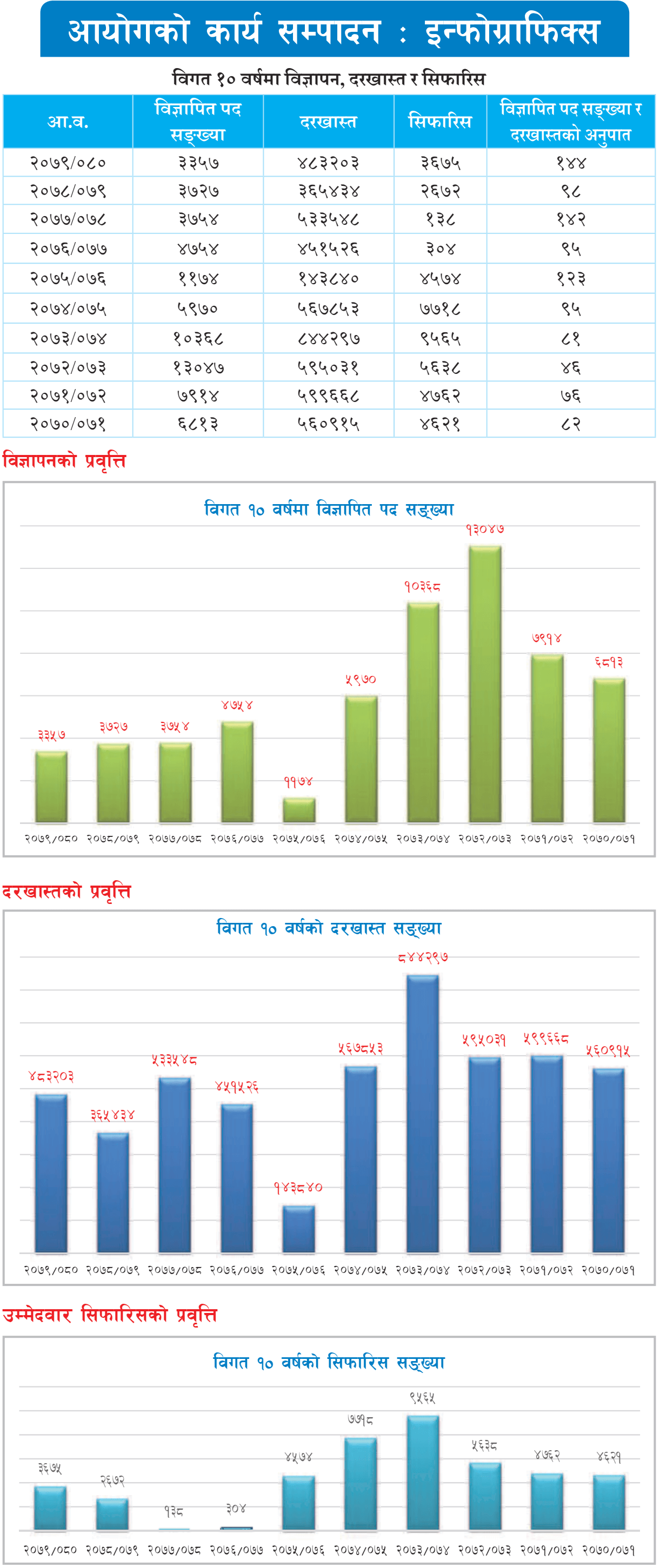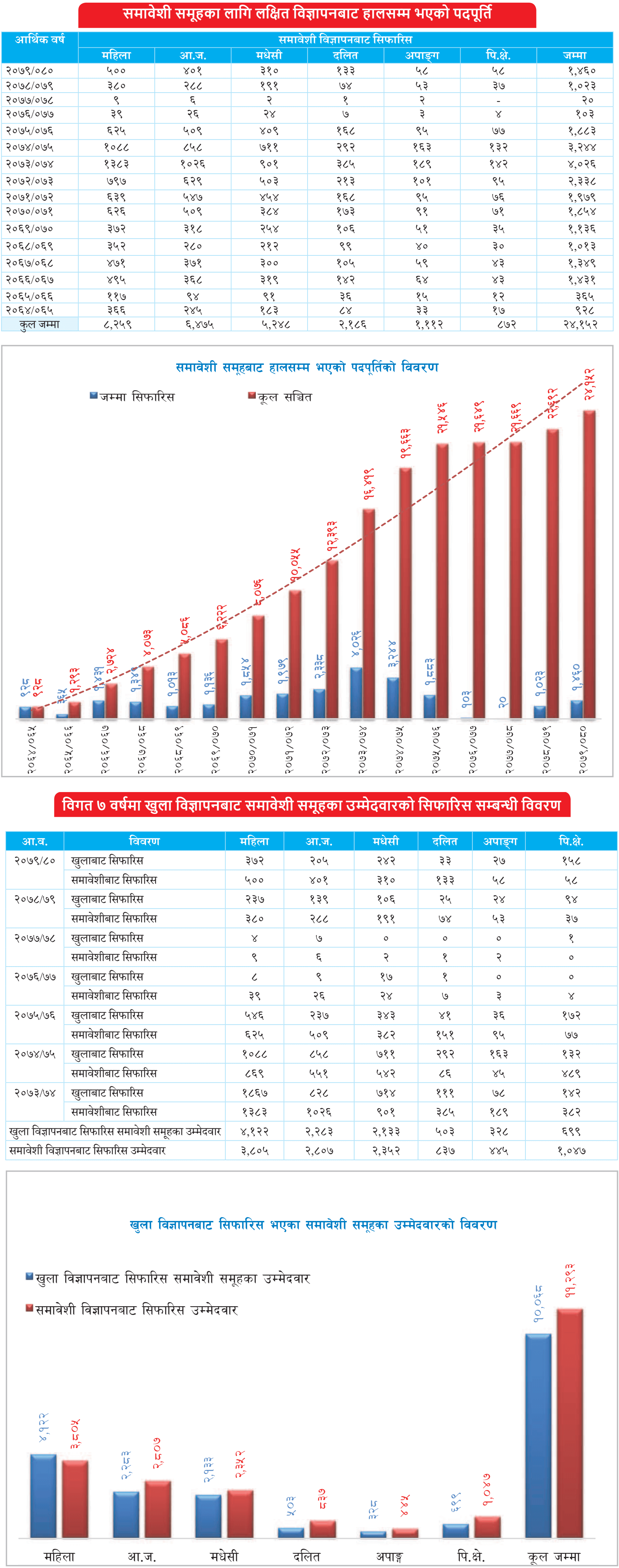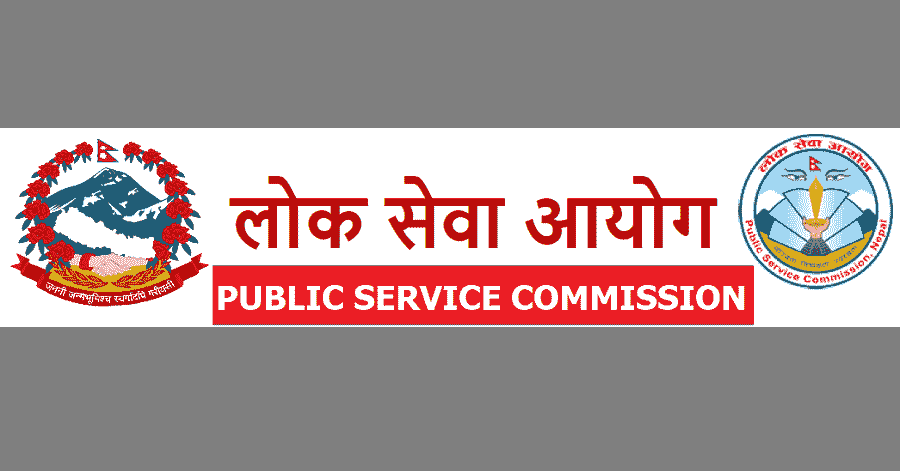
Public Service Commission (PSC - Lok Sewa Aayog) 74th Anniversary Special
The Public Service Commission (PSC - Lok Sewa Aayog) was formally established on Asar 1, 2008 BS (June 14, 1951 AD), as per the provisions mentioned in Article 64 of the Interim Government of Nepal Act, 2007 BS (1951 AD), under the name "Nepal Public Service Commission".
The Public Service Commission is a specialized constitutional body. Its formation, functions, duties, and powers are stipulated in Part 23, Article 242, and Article 243 of the Constitution of Nepal. The commission comprises a chairperson and four other members, making a total of five officials. At least fifty percent of the members must be appointed from among those who have served in any government service for twenty years or more. The remaining members are appointed from individuals who have earned a reputation for significant contributions in science, technology, arts, literature, law, public administration, sociology, or other fields of national importance through research, teaching, or other significant work.
The chairperson and members of the Public Service Commission have a tenure of six years from the date of their appointment and cannot be reappointed. However, a member can be appointed to the position of chairperson as per the constitutional provisions.
The Public Service Commission is responsible for selecting the most suitable candidates for appointments in the federal civil service and recommending them for permanent appointments. Additionally, the commission conducts written examinations for positions in security agencies and organized institutions. In this regard, the commission is involved in the recruitment process for positions in four security agencies and 101 organized institutions.
Historical Event:
- 2008 Asar 1: Establishment of the Public Service Commission
- 2008 Bhadra 18: First Advertisement (for 6 positions) published
- 2012: Graduate/Graduate Officer selection started
- 2016: First report of the Public Service Commission presented
- 2017: Public Service Commission suspended (from 2017 Magh 25 to 2018 Jestha end)
- 2023: Responsibility for the recruitment of organized institutions received
- 2043: Authority to formulate general principles regarding the recruitment of public institution employees received
- 2047: Commission's authority area limited to civil service
- 2063 Magh 1: Responsibility for providing consultation on general principles regarding appointments and promotions in security agencies received
- 2063: Provision for the organization to consult the Commission on matters of 'Chauhama' promotions and departmental actions
- 2069 Baisakh 13: Provision for mandatory use of black ink in the answer sheets for examinees
- 2069 Bhadra 7: Optical Mark Reader (OMR) technology-based objective multiple-choice exam started
- 2071 Chaitra 23: Started accepting applications through the online system
- 2072 Asoj 3: Responsibility for conducting written exams for filling positions in security agencies and organizational institutions received
- 2072 Poush 6: Double-checking of answer sheets started
- 2073: Introduction of Assessment Center Methodology (ACM) exam technology
- 2075: In Basket Exercise exam started for Gazetted Second Class, Upa Sachiv (non-technical) positions
- 2076 Jestha 15: First simultaneous advertisement for 9161 positions at the local level
- 2077: Started conducting exams for ninth level and above positions within the Commission's premises by experts
- 2079 Asar 31: Public Service Commission Act, 2079 issued as per the Constitution of Nepal
- 2080: Implementation of the second strategic plan of the Public Service Commission (2079/80-2083/84) started
Principles of the Public Service Commission's Performance:
-
Merit: The Public Service Commission (PSC) recommends candidates for appointment based on the highest scores achieved in exams. The curriculum is designed to test the necessary knowledge, skills, and attitudes required for the respective positions, ensuring that recommended candidates are capable of performing their duties effectively.
-
Impartiality: PSC decisions are free from bias. The commission ensures that no one is treated unfairly in its decisions and examination processes, maintaining complete neutrality.
-
Fairness: All PSC operations are conducted with integrity, responsibility, reliability, and accountability. Institutional, structural, and procedural arrangements are made to ensure that the commission's decisions and examination processes are transparent and objective.
-
Equal Opportunity: The PSC ensures that all eligible Nepali citizens have access to apply for advertised positions by providing equal opportunities to those who meet the specified qualifications.
-
Inclusiveness: Recruitment is carried out in accordance with the state’s inclusiveness policy, ensuring that positions are filled through competition among candidates from the relevant groups as per prevailing laws. The provision of inclusive participation is also ensured when forming interview committees.
-
Principle of Double Blind: Individuals involved in one confidential stage of the recruitment process are not involved or informed about other stages. Examiners do not know whose answer sheets they are evaluating, and the staff involved in tabulating scores are unaware of which marks belong to which candidates. The results branch only knows the names of successful candidates but not their scores. Interview committee members are completely unaware of the candidates' written exam scores.
-
Identity Masking: Before evaluating answer sheets, the part revealing the candidate's identity is removed through a double coding process. Answer sheets are then assessed based on codes. After evaluations, a score table is prepared without personal identification. The final selection of candidates is made by decoding the identity only after all scores from various selection processes, including interviews, are integrated.
-
Non-Involvement: If any relative of a PSC official, employee, or subject expert is a candidate in any PSC exam, that official, employee, or expert is excluded from the entire examination process until the final result is published.
-
Confidentiality: To maintain the credibility of the examination system, the PSC ensures confidentiality at various stages of the recruitment process. The creation, modification, and selection of exam questions remain completely confidential. Personal information in the PSC's online database is also kept confidential, ensuring quality and confidentiality throughout the recruitment process stages.
Improvements and Innovations in the Commission:
The Public Service Commission has been operating based on the three main principles of merit, impartiality, and fairness. To effectively fulfill its constitutional responsibility of selecting suitable candidates for civil service, the PSC has continuously adopted various innovative technologies and improvements in the candidate selection process.
Online Application System: Implemented from 2071/12/23 BS, the online application system allows for the collection of applications through electronic means. This system is linked with the Office of the Auditor General's 'Revenue Management Information System (RMIS)' and enables application fees to be paid via Mobile Wallet, e-Sawa, and other mediums through the e-payment system.
Improvement in Answer Sheet Evaluation System: To make PSC examinations more impartial, all answer sheets for first and second-class gazetted services are evaluated by two experts, and if there is a significant difference in their scores, a third expert is brought in for evaluation. The PSC has arranged for the evaluation of answer sheets within its own premises. For objective multiple-choice answer sheets, the Optical Mark Reader (OMR) machine is used for automated evaluation.
Adoption of Innovative Testing Methods: Following the policy to gradually implement 'Assessment Centre Methodologies (ACM)' as an innovative method, 'Case Presentation' is arranged for first-class gazetted (non-technical) positions and 'In Basket Exercise' for second-class gazetted (non-technical) positions. For third-class gazetted positions, group discussions are employed for candidates who pass the written exams.
National Conference of Public Service Commissions: To establish and promote the PSC’s standard procedures at the provincial level, a national conference of public service commissions has been organized annually in the month of Falgun since 2077 BS. So far, four national conferences have been held: in Kavrepalanchok district in 2077 BS, in Rupandehi district in 2078 BS, in Kailali district in 2079 BS, and in Surkhet district in 2080 BS.
